Top Ten Healthy and Nutritious Vegetables
Introduction
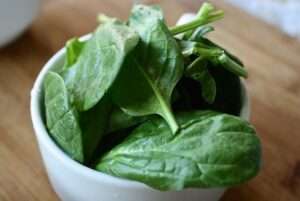
1. Spinach
Spinach is a very nutritious leafy green vegetable, containing a variety of vitamins and minerals. It is rich in antioxidants, such as beta-carotene and lutein, which help protect the body from oxidative stress. It is low in calories, making it a great option for those looking to manage their weight. This is a good source of folate, a B-vitamin important for DNA synthesis and repair, and it is especially important during pregnancy. The fiber in spinach promotes digestive health, helps regulate blood sugar levels, and contributes to a feeling of fullness. Spinach is versatile and is used in various dishes, including salads, smoothies, sautés, and soups. Spinach contains below mentioned vitamins and minerals:
Vitamin K
Vitamin A
Vitamin C
Folate
Iron
Magnesium

2. Carrots
Carrots are high beta-carotene content, a pigment that the body convert them into vitamin A. Vitamin A is essential for vision, immune function, and skin health. They contain antioxidants, including beta-carotene, that help protect the body from oxidative stress and may reduce the risk of certain chronic diseases. They are low in calories, making them a healthy and satisfying snack for those looking to manage their weight. These are a good source of dietary fiber, which is important for digestive health and contribute to a feeling of fullness.The antioxidants and potassium in carrots contribute to heart health by helping to lower blood pressure and reduce the risk of cardiovascular diseases. Carrots contains following vitamins:
Vitamin K
Vitamin A
Vitamin C

3. Broccoli
Broccoli is a highly nutritious vegetable, rich in vitamins and minerals. It is packed with antioxidants, including sulforaphane, which has been linked to various health benefits, including reducing the risk of chronic diseases. It is a good source of dietary fiber, which supports digestive health, helps regulate blood sugar levels, and contributes to a feeling of fullness. Some compounds in broccoli, such as sulforaphane, have been studied for their potential cancer-fighting properties, particularly in terms of reducing the risk of certain types of cancer. The fiber, potassium, and antioxidants in broccoli contribute to heart health by helping to lower blood pressure, reduce cholesterol levels, and support overall cardiovascular function. Compounds in broccoli, including sulforaphane, support the body’s natural detoxification processes. Vitamins & minerals in broccoli are as follows:
Vitamin K
Vitamin A
Vitamin C
Folate
Potassium
Manganese
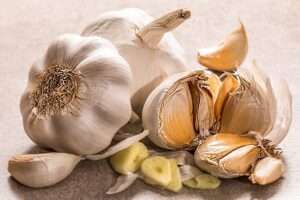
4. Garlic
Garlic has been known for its antimicrobial properties, and it includes allicin, a compound with potential antibacterial, antiviral, and antifungal effects. These are rich in antioxidants, including allicin, which helps protect the body’s cells from oxidative damage. It has been associated with cardiovascular benefits, such as helping to lower blood pressure and cholesterol levels, and supporting overall heart health. Includes compounds that have anti-inflammatory effects, contributing to overall health and potentially reducing the risk of chronic diseases. The antioxidants in garlic, along with its potential antimicrobial properties, contribute to immune system support. Garlic is:
Allicin
Antioxidant
Anti-inflammatory

5. Brussel Sprouts
Brussel Sprouts contain antioxidants like kaempferol, they help protect cells from oxidative damage and inflammation. These are a source of glycosylates, compounds that have been linked to potential cancer-preventive effects. The fiber in Brussels sprouts supports digestive health, promotes regular bowel movements, and contributes to a feeling of fullness. They are prepared in various ways, such as roasting, sautéing, or steaming, and added to salads, stir-fries, or served as a side dish. It contain iron, which is important for the transportation of oxygen in the blood and overall energy metabolism. It contains below mentioned vitamins and minerals:
Vitamin K
Vitamin C
Folate
Manganese
Fibre
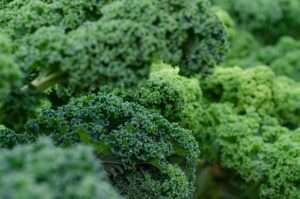
6. Kale
Kale is rich in antioxidants, including beta-carotene, flavonoids, and polyphenols. These compounds help combat oxidative stress in the body, reducing the risk of chronic diseases. Kale contains compounds that may contribute to heart health. It can help lower cholesterol levels, improve lipid profiles, and support overall cardiovascular function. High fiber content in kale promotes digestive health by aiding in regular bowel movements, preventing constipation, and supporting a healthy gut microbiome. The high levels of lutein and zeaxanthin in kale are beneficial for eye health. These antioxidants help protect the eyes from age-related macular degeneration and cataracts. The fiber and antioxidants in kale may contribute to better blood sugar control. This can be particularly beneficial for individuals with diabetes or those at risk of developing diabetes. It includes:
Vitamin K
Vitamin C
Vitamin A
Calcium
Potassium
Iron
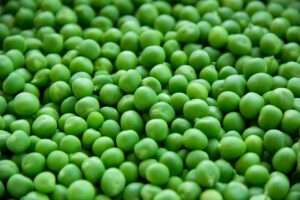
7. Green Peas
Green peas are a rich source of dietary fiber, which is essential for digestive health. Adequate fiber intake supports regular bowel movements and helps prevent constipation. Green peas contain antioxidants like flavonoids and carotenoids, including beta-carotene. These antioxidants help neutralize free radicals in the body, reducing oxidative stress and inflammation. The fiber, potassium, and antioxidants in green peas contribute to cardiovascular health. They can help lower cholesterol levels, regulate blood pressure, and reduce the risk of heart disease. The fiber content in green peas slows down the digestion and absorption of sugars, helping to stabilize blood sugar levels. This can be beneficial for individuals with diabetes or those at risk of developing diabetes. It contain vitamin K, which is important for bone health. Vitamin K plays a role in bone mineralization and helps prevent conditions like osteoporosis. Green peas contains:
Vitamin K
Vitamin C
Vitamin B
Folate
Phosphorus
Iron
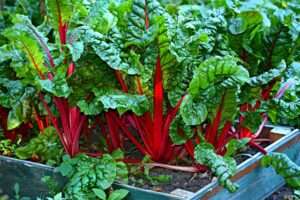
8. Swiss Chard
Swiss chard is rich in antioxidants, including beta-carotene and flavonoids. These compounds help protect the body’s cells from oxidative stress. The antioxidants in Swiss chard, along with its flavonoids, contribute to its anti-inflammatory properties. Regular consumption may help reduce inflammation in the body. The potassium in Swiss chard may contribute to heart health by helping regulate blood pressure. Adequate potassium intake is associated with a lower risk of cardiovascular issues. Swiss chard is a good source of vitamin K, which is essential for bone health. It plays a crucial role in bone mineralization and helps prevent osteoporosis. The fiber and other compounds in Swiss chard may contribute to better blood sugar control. This can be beneficial for individuals with diabetes or those at risk of developing diabetes. Swiss chard includes:
Vitamin K
Vitamin C
Vitamin A
Magnesium
Potassium
Iron

9. Beets
The nitrates in beets may help lower blood pressure by dilating blood vessels, improving blood flow, and supporting cardiovascular health. It contain betalains, which have anti-inflammatory and antioxidant properties. These compounds may help reduce inflammation in the body. The fiber in beets promotes digestive health by supporting regular bowel movements and preventing constipation. This vegetable contain various antioxidants, including betalains and vitamin C, which help protect cells from oxidative damage. Betalains in beets may support the body’s natural detoxification process by aiding in the elimination of toxins. Beets are low in calories and high in water content, making them a filling and nutritious option for those looking to manage their weight. The fiber in beets helps regulate blood sugar levels by slowing down the absorption of sugar. Some studies suggest that the nitrates in beets may have positive effects on cognitive function and brain health. Beets contain:
Vitamin C
Folate
Magnesium
Potassium

10. Asparagus
Asparagus help combat oxidative stress and inflammation in the body. It is high in dietary fiber, promoting digestive health by supporting regular bowel movements and preventing constipation. The folate content in asparagus contributes to heart health by helping regulate homocysteine levels, which, when elevated, is considered a risk factor for cardiovascular issues. The fiber in asparagus slows down the digestion and absorption of sugars, helping to regulate blood sugar levels. This can be beneficial for individuals with diabetes or those looking to manage blood sugar. Asparagus has diuretic properties, which means it can help flush excess fluids and salts from the body. This may be beneficial for individuals with edema or high blood pressure. It include:
Vitamin K
Vitamin C
Vitamin A
Magnesium
Potassium
Iron


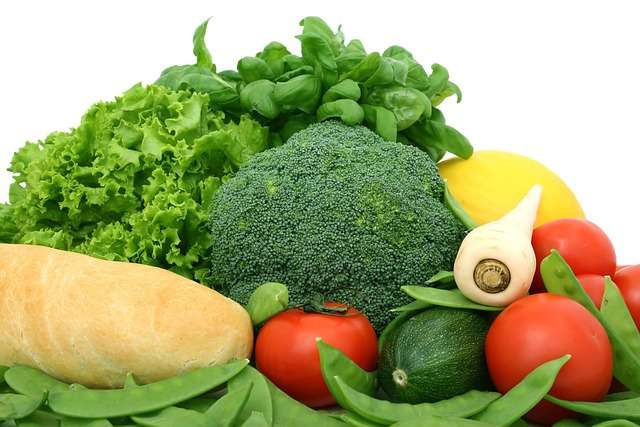


Hi there to all, for the reason that I am genuinely keen of reading this website’s post to be updated on a regular basis. It carries pleasant stuff.
Thanks for your response and recommendation
Thanks for your response for our development, We shall focus on that part in future
I think all the thoughts you’ve given for your post are convincing and will function, but the posts are rather short for beginners. Could you prolong them a bit from next time? Thanks for the post.